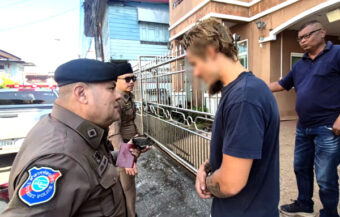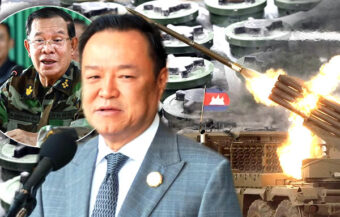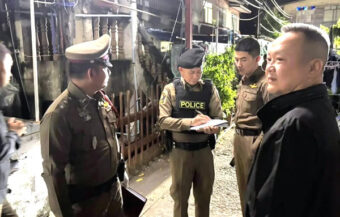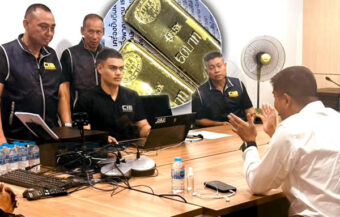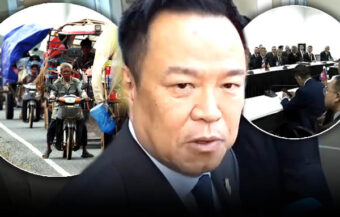Moon spaceship programme to be launched officially in January by the Ministry of Education, Science, Research and Innovation in what is a serious effort to establish Thailand’s credentials not only in the space race but among the top tier of countries claiming the highest technological expertise as well as giving a boost to national confidence.
The Thai government has announced that it is to send a spacecraft to the moon within 8 years in a project that will be delivered within a budget of ฿3 billion. Further details are expected in January but the move is designed to establish the bona fides of the kingdom in technological terms as Thailand races to break out of the middle-income economic trap which the kingdom is currently stuck in.
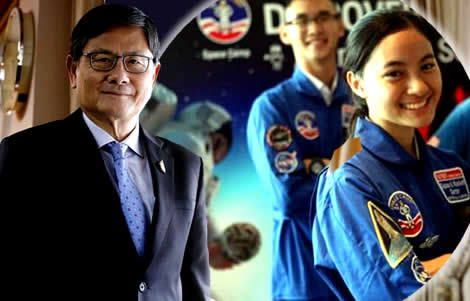
The Thai government, in January 2021, is to unveil a plan to build a spaceship capable of travelling to the moon and entering its orbit in the coming 8 years.
This announcement by Minister of Higher Education, Science, Research and Innovation, Anek Laothamatas, on Christmas Eve has sparked controversy online with many pundits expressing both scepticism and scorn at the proposal given the levels of poverty and inequality currently being experienced in the kingdom still reeling from the economic crisis caused by the Covid 19 pandemic and where many casual workers are unemployed on a long-term basis and without prospects except for short term social welfare schemes.
Proposal has substance and will be detailed further in an official launch of the programme in January
However, the minister’s proposals, which will be outlined in further detail in January, do appear to have substance.
The science and innovation programme is linked to Thailand’s broader economic objectives to transform the Thai economy.
The announcement in January, according to the minister, will detail a lunar mission to be undertaken by the kingdom.
On Thursday, Minister Anek explained the initiative being pursued by his ministry based on efforts to move Thailand forward in the race to create a high-income economy and escape the clutches of what is termed by economists as the middle-income trap.
Thailand striving to escape the middle-income trap
The middle-income trap is a term used by economists to describe certain national economies that have managed to evolve but still have a per capita GDP of less than $12,500 per annum while they struggle to move into the first tier of developed or high-income countries.
Thailand is on a fluctuating list of about twelve national economies in this category but progress is being challenged by internal weaknesses and also now by new, disturbing levels of resistance caused by local political changes that have manifested themselves in developed countries.
At the end of the day, the key metric towards the goal of becoming a high-income economy is annual economic growth in GDP terms.
The World Bank, last week, said that Thailand must retain annual growth of 5% per annum between 2023 to 2025 to keep to its extended goal of becoming a high-income country by 2037 in its sights.
The GDP per capita for the country in 2019 was just over $7,800 and this was based on a growth achieved of over 7% from 2018.
The Thai economy actually contracted marginally in 2019 and is facing a contraction of between 7% and 8% for 2020. All this while growth in developed economies has slowed and with record contractions in 2020, making it harder again for emerging countries.
Thailand had been seen as a strong contender to become a high-income country in the next 20 years
Thailand had been seen by agencies such as the World Bank as one of the countries in the best position to make the leap into the first tier, something it must do as its second generation economy, based on low-cost labour, exports and tourism is losing ground to cheaper and younger competitors in Asia such as Vietnam which had annual GDP per capita of just $2,715 in 2019.
Thailand had been successful in developing a significant industrial-economic footprint second only to China among Asia’s developing economies.
US-China trade war and geopolitical changes have challenged this trajectory as growth has stalled
However, the US-China trade war and the moves sparked by US President Donald Trump’s economic policies as well as political movements in other western countries, have caused a review of global supply chains making them shorter, more local by using robotics instead of cheap labour.
Thailand is among a group of countries including China, South Africa, Brazil and Turkey who are striving to attain a higher level of annual income and standard of living but this will be very much dependent on consistent economic growth above 5%.
The World Bank in recent years had estimated that Thailand could achieve this goal by 2028 although this has now been extended outwards to 2037.
Kingdom’s internal problems also impacting
The kingdom also has a growing number of internal problems that are potential obstacles in the way of attaining this key goal.
These are an increasingly negative demographic base, a chronic problem only now being openly acknowledged by economists as one of the most critical factors hampering the world’s overall economic progress.
Thailand’s median age for workers is now close to 40 years of age, even higher than China’s.
The kingdom also has a problem with corruption and its educational standards.
Many economists point to political polarisation and instability as a sign that Thailand’s developing economy is failing to transition to higher-income status.
The economic deterioration of countries like South Africa, Argentina and even Russia are all examples of what can happen when things start to go wrong.
So this is why Thailand is keen to develop its credentials in the race to space as well as other social reforms currently being introduced by the government such as greater rights for the LGBT community, welfare schemes, a move this week to liberalise the kingdom’s abortion laws and radical plans to update the education system with an emphasis on English.
Five years to build and put satellites into orbit followed by three years to build a spacecraft
The minster, on Thursday, outlined a plan to develop, first of all, advanced satellites in the 50 kg to 100 kg range which the kingdom will launch into orbit. This will take five years.
He then explained that Thailand will aim to build a spacecraft which can travel to the moon and enter into lunar orbit. This will take a further three years.
‘The new economy of space travel will be a way for Thailand to overcome the economic effects of the Covid-19 pandemic and then to escape the middle-income trap, and the ministry will embrace creativity and innovation,’ Minister Anek disclosed.
The plan is expected to be based on the use of a xenon ion thruster rocket used by NASA and a 300 kg spacecraft which can be launched effectively out of the earth’s orbit.
It would then travel to the moon at 11km per hour. Once there, it would slow to 2km per hour and enter the moon’s orbit.
฿3 billion project designed to emphasise and showcase Thailand’s technological capabilities to the world
As well as proving Thailand’s credentials in the advanced technology sector, the move will also boost confidence in the kingdom underscored by public reaction to the proposal.
The minister insisted that all this will be achieved with a budget of ‘only’ ฿3 billion. However, the figure itself was latched upon by online social media critics as money that could be spent in Thailand today to alleviate the circumstances of the poor, particularly in rural Thailand.
News of the space programme was first raised by the minister on December 14th last when he said that Thailand would be the fifth country in Asia to reach the moon behind China, India, Japan and South Korea.
In August 2019, Thailand’s Royal Air Force announced the creation of a National Space Centre. At the time, the unit’s mission was described as preserving Thailand’s security in space while also laying the foundation for future missions.
Get all our latest stories, follow Thai Examiner on Facebook here
Further reading:
Finance Minister says economy must pivot away from tourism with a switch to S-Curve industries
Strengthening baht predicted as investors bet on a reopening of Thailand to mass tourism in 2021
World’s biggest free trade deal just signed will be a huge boost for the Thai economy and exports
RCEP deal agreed as India opts out – busy Bangkok ASEAN summit concludes on a low key
Chinese FM to visit Thailand in a Covid battered world of raised tensions and potential conflict
Prime Minister indicates that the cabinet reshuffle will be complete very shortly with no problem
Thailand’s economy has become dependent on government expenditure to stay above water
Thailand and US aim for a new more ‘proactive’ trading relationship as ambassador meets Prayuth
Rice price spike but drought conditions to recede – security concern for the Mekong river
US suspension of Thai preferential trade partner status part of Trump’s ongoing trade war

